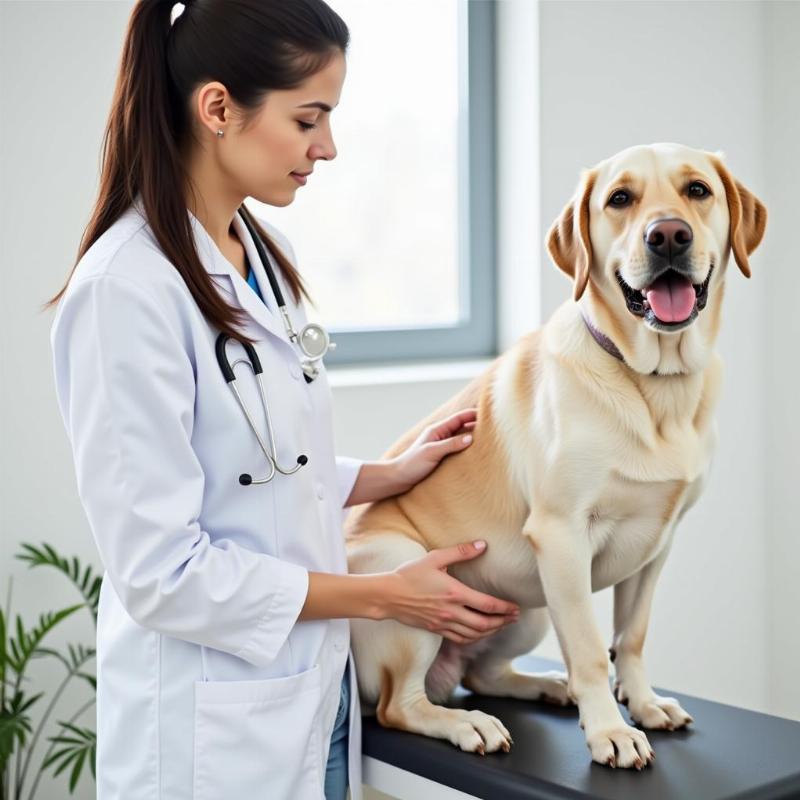Dogs love exploring the world with their mouths, and unfortunately, that sometimes includes your carefully laid mulch. While mulch can add aesthetic appeal to your garden, it can pose health risks to your furry friend. If you’re wondering how to stop dogs from eating mulch, you’ve come to the right place. This comprehensive guide will provide you with actionable strategies and expert advice to keep your dog safe and your garden intact.
Why Do Dogs Eat Mulch?
Several reasons can contribute to a dog’s mulch-eating habit. Puppies and young dogs often explore their surroundings through chewing, and mulch can become a tempting target due to its texture and scent. Some dogs may be attracted to the smell of decaying organic matter in the mulch, while others might be experiencing nutritional deficiencies, leading them to seek out non-food items. Boredom and anxiety can also manifest as destructive behaviors like mulch-eating. Identifying the root cause is crucial for effective intervention.
Dangers of Mulch Ingestion
While some types of mulch are relatively harmless, others can pose serious threats to your dog’s health. Cocoa mulch, for example, contains theobromine, a compound toxic to dogs. Even non-toxic mulches can cause gastrointestinal upset, vomiting, diarrhea, and blockages if ingested in large quantities. Sharp pieces of wood mulch can also irritate the mouth and digestive tract.
Effective Ways to Stop Your Dog From Eating Mulch
Understanding how to stop dogs from eating mulch requires a multi-faceted approach. Here are some proven strategies:
- Remove the Temptation: The simplest solution is often the most effective. Consider replacing potentially harmful mulch with dog-friendly alternatives like shredded pine bark, cedar chips, or cypress mulch.
- Create a Designated Dog Zone: Give your dog a dedicated area in your yard where they can play and explore without access to the mulched areas. This can be achieved with fencing, barriers, or designated play pens.
- Provide Plenty of Chew Toys: Boredom can lead to destructive chewing. Offering a variety of engaging chew toys can redirect your dog’s attention and satisfy their natural chewing instincts.
- Training and Reinforcement: Positive reinforcement training can teach your dog to “leave it” when they approach the mulch. Reward them with treats and praise when they obey your command.
- Supervise and Redirect: Keep a close eye on your dog when they’re in the yard, especially during the initial stages of training. If you see them heading towards the mulch, redirect their attention with a toy or a game.
Dog-Friendly Landscaping Alternatives
If you’re not willing to sacrifice the aesthetic appeal of mulch, opt for dog-friendly options. Pine, cedar, and cypress mulch are generally safer for dogs than cocoa mulch. You can also consider using rocks, gravel, or ground cover plants as alternatives.
When to Consult a Veterinarian
If your dog exhibits symptoms like vomiting, diarrhea, lethargy, or loss of appetite after potentially ingesting mulch, consult your veterinarian immediately. They can assess the situation and provide appropriate treatment.
“Early intervention is key,” says Dr. Emily Carter, DVM, of the Animal Wellness Center in Austin, Texas. “If you suspect your dog has ingested a potentially harmful substance like cocoa mulch, don’t wait for symptoms to appear. Seek immediate veterinary care.”
 Veterinarian examining a dog
Veterinarian examining a dog
Conclusion
Keeping your dog from eating mulch involves understanding the underlying reasons for their behavior and implementing appropriate preventative measures. By combining environmental modifications, training, and supervision, you can create a safe and enjoyable outdoor environment for both your furry friend and your garden. Remember to always consult your veterinarian if you have any concerns about your dog’s health.
FAQ
- What kind of mulch is safe for dogs? Shredded pine, cedar, and cypress mulch are generally considered safe options. Avoid cocoa mulch, as it contains theobromine, which is toxic to dogs.
- My dog keeps eating mulch even after I provide chew toys. What should I do? Try reinforcing “leave it” training and increasing supervision. You may also need to consult a veterinarian or a professional dog trainer for additional guidance.
- Can mulch cause intestinal blockage in dogs? Yes, especially if ingested in large quantities. If your dog experiences vomiting, diarrhea, or constipation after eating mulch, consult your veterinarian immediately.
- What are the signs of mulch poisoning in dogs? Symptoms can vary depending on the type of mulch ingested, but may include vomiting, diarrhea, tremors, seizures, and hyperactivity.
- Are there any plants that can be used as dog-friendly ground cover instead of mulch? Yes, several ground cover plants are considered safe for dogs, such as clover, creeping thyme, and chamomile. Always research a plant’s toxicity before introducing it to your dog’s environment.
- How do I train my dog to “leave it”? Start by holding a treat in your closed fist. When your dog tries to get the treat, say “leave it.” Once they stop trying, open your hand and give them a different treat as a reward. Gradually introduce distractions and increase the distance between your dog and the object you want them to leave alone.
- What should I do if my dog vomits after eating mulch? Consult your veterinarian immediately, especially if the vomiting is persistent or accompanied by other symptoms like lethargy or loss of appetite.
Related Articles
Beautdogs.us is your premier source for all things dog-related in the US. We offer expert advice on dog breeds, care, and product recommendations for both new and experienced dog owners. Our mission is to provide you with the information you need to nurture a happy, healthy relationship with your canine companion. For expert advice tailored to your needs, contact us today! Email: [email protected], Phone: +1 501-555-7529. Connect with Beautdogs.us, your trusted partner in dog care.